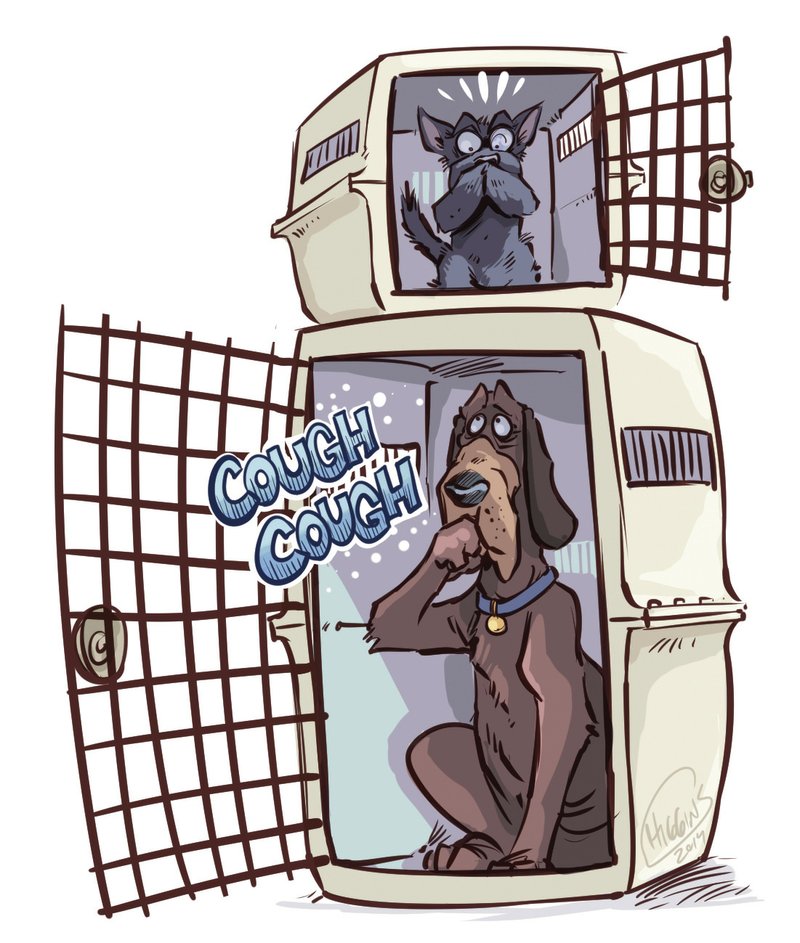My dog gets groomed every month and I recently switched groomers. The new groomer, who works in my veterinarian's office, says that my dog needs to be vaccinated for kennel cough because she spends the day with the other dogs there for grooming. In fact, she says my dog needs the shot before she can be groomed there. How long does a shot last? Is it really necessary?
The vaccination, which is effective for a year, is necessary because kennel cough is highly contagious, especially when dogs spend time together in an enclosed area such as a grooming or boarding facility, says veterinarian Katie Baeyens of Baeyens Hauk Veterinary Group in Sherwood.
Kennel cough or canine infectious tracheobronchitis causes an inflammation of a dog's windpipe and voice box so the primary symptom is a persistent cough that sounds like a honk. Most dogs catch kennel cough when they're boarded or kenneled with other dogs. A bacteria called bordetella bronchiseptica causes the virus and it spreads from dog to dog through the air.
Baeyens says the bordetella vaccine can be given to the dog through nasal drops as well as in a shot. Typically, a dog needs it only once a year but sometimes veterinary clinics require vaccination at six-month intervals if they are worried about an outbreak.
Kennel cough, while contagious, doesn't cause severe health problems and the symptoms usually disappear after three weeks after treatment begins. Puppies, elderly dogs and dogs with weakened immune systems may take longer to recover. Untreated, kennel cough could progress to pneumonia.
Ice ice, puppy: While talking with Baeyens, I asked her to address another reader's question about a rumor circulating on the Internet about possible health hazards of putting ice cubes in a dog's water bowl. Baeyens says not to worry. The only problems that might arise are if the dog decides to chew or swallow the ice whole. Then there's the possibility of breaking a tooth or choking, but either is unlikely.
App happy: When everything is going well, it's hard to think about the possibility of when they might not -- such as if a pet gets lost. But a new mobile application created by the American Society for the Prevention of Cruelty to Animals helps pet owners prepare for the thing they hope never happens, then rest easy.
The ASPCA app for Android and iOS smartphones (free on iTunes and Google Play) gives pet owners a simple way to keep medical records and other information about their pets with them. A pet owner can upload a photo or use an existing one -- and what pet owner doesn't have a pic or 10 of his pet on his phone -- then add details about breed, size, color, weight, microchip number, medications, veterinarian and dietary needs.
If a pet is lost, the app uses the stored information to create a digital flier that the owner can post on social media websites. The app also asks a series of questions so that it can then create a personalized "action checklist" that might include putting up posters, conducting a door-by-door survey of neighbors to see if they've taken in the dog, contacting a pet detective and turning your car into a rolling missing pet poster.
The app, which I found to be simple to use, also offers suggestions on preparing for and what to do during a natural disaster.
Animal magnetism: Ever seen a dog sniff and circle when looking for a place to potty? The behavior might signal more than a search for the perfect place -- like something about a dog's place in the cosmos and his attunement to the earth's magnetic field. A study published in Frontiers in Zoology suggests that dogs prefer to do their business with their bodies aligned along the north-south axis under calm magnetic conditions. Might be worth taking a compass on your next trip outside with the dog just to see.
Family on 07/30/2014

